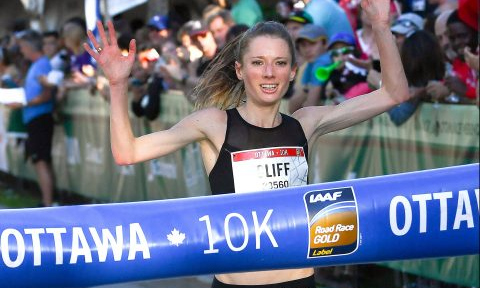Dylan Wykes is an Olympian, founder of Mile2Marathon Coaching and the new elite runner coordinator for the Scotiabank Ottawa Marathon. We all know by now the deal with races. They ain’t happening. However, Wykes, working with his race director Ian Fraser, has created a Canadian 10K Championship, to be held virtually on July 1. It’s the first race of its kind and features a challenge component for the regular middle-of-the-pack hoofer. Teams of ten can work together and run 1K splits in the hopes of beating our elite champions. Ben Kaplan caught up with Wykes as their children wailed in the background.
BK: Thanks for doing this. I feel like it’s interjecting a shot of fun into an otherwise dreary existence.
DW: I said to Ian, ‘Would you ever do something for the elites beyond having them do the mass participation virtual races, in terms of having structure and prize money?’ He was receptive to it and we bantered around and came up with a few different scenarios.
BK: And you just called up your friends, racers like Natasha Wodak and Rachel Cliff?
DW: Basically. It was just people I know in the running world who I thought would be into it and everyone who had signed up for the real race, and just went from there. It was probably a week ago.
BK: Is that usually how long it takes to set up a race?
DW: In an ideal world, this would’ve been set up months and months ago. Elites want time to prepare but: it is what it is. I think it’s an opportunity for people who are in shape and who’ve stayed in shape and others, who haven’t been doing a lot, are saying, ‘I’m out,’ and that’s cool.
BK: It’s cool that it’s on Canada Day and racers have a six-hour window to complete their race. Results will be posted on Sportstats.
DW: People can log on and see who’s winning at any given point in time. The idea is to have some fun, race, and give people something to do.
BK: How do you know that people won’t cheat?
DW: We thought about that. We thought about maybe limiting it to ten people and get their route accredited, but you know what? We didn’t have the resources for that, and also we have to trust everyone to be honest. We’re asking people to have video evidence, and asking racers to do an out and back course, so they can’t just run down a mountain. This is a competition and a race, but we want people also to recognize the fun element.
BK: I think our world is small enough that we can basically trust one another.
DW: I hope we don’t get into a situation where so and so gets beaten by five seconds and gripes that so and so’s course is faster. It’s inevitable. And GPS data isn’t accurate. I mean, everyone’s watch has different distances and times. But I think we need to all take a small step backwards and step back from our uber-competitiveness and realize this might be an odd scenario where things come out a bit wonky, but I’m an optimistic person. I think we’ll be fine.

BK: If someone cheats at this they should forever have their sneakers encased in concrete.
DW: Cheating in general is kind of mind boggling. It’s a hard thing to wrap your head around but if I see a huge outlier, I’m not afraid to call someone out.
BK: I have faith in runners. Let’s talk about the competition aspect for runners like myself and my crew—runners who have a chance to race against you.
DW: It’s a Beat the Champions thing and the coolest thing about the sport of running is that anyone can interact with the top people. Any runner who competes at the Scotiabank Ottawa 10K lines up at the same start line as the top Canadians in the country. So we’re trying to give people that same opportunity. You can’t see people running live in person—to see how fast they whip past—but in the sense of running 1K splits with your team, it gives everyone a sense of what it means to be elite.
BK: It’s like the Kipchoge treadmill challenge they had at the Chicago Marathon.
DW: Exactly, and we did this in 2012 at Forerunners, where I used to work in Vancouver. We had a relay on the track and people tried to run the pace I was doing in the marathon for 200-metres or as long as you want. It was a lot of fun and hopefully it just gets people running.
BK: The New York Marathon just cancelled, Berlin. What’s your take on the state of racing?
DW: It’s tough. You have to give people the opportunity to mourn the loss of their race. For a lot of people, these races are lifelong goals. Hopefully the opportunity will be there in the future. I was supposed to run Boston this year and it didn’t happen, and now we know it also won’t happen in the fall. It’s disappointing, but I think you can find a silver lining.
BK: Which is?
DW: Many of us get stuck in the cycle where we run marathons or even races in the spring and the fall. Obviously now that didn’t happen. So it’s a chance to train for different things, switch up your training and remove the pressure of a race on the horizon.
BK: Well, except for the Canadian 10K Championships.
DW: Right. The pressure for that one is real.






 Current Issue
Current Issue Previous Issue
Previous Issue Prior Release
Prior Release
